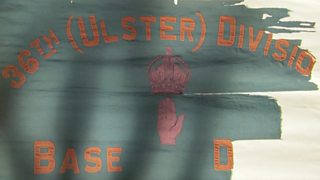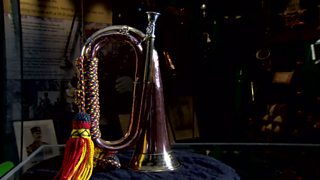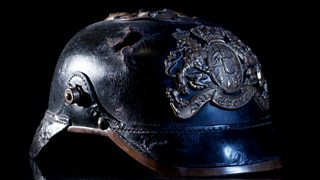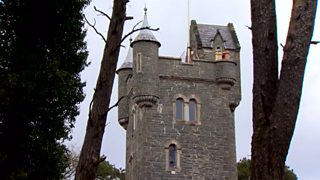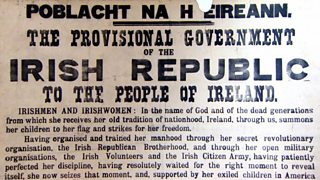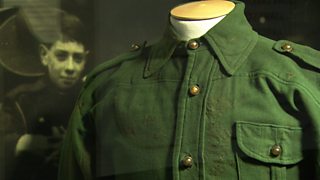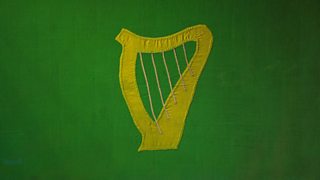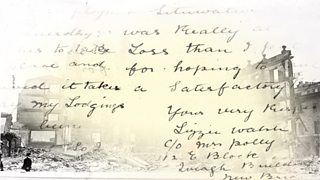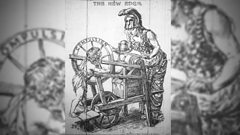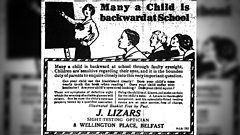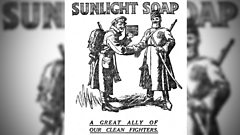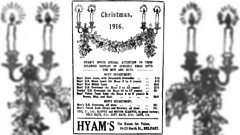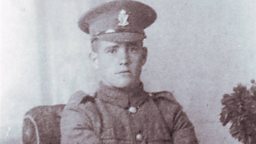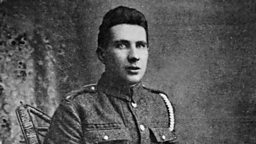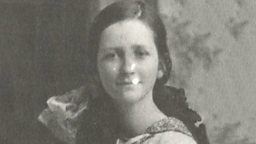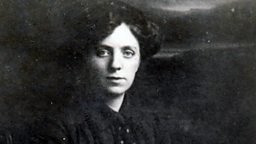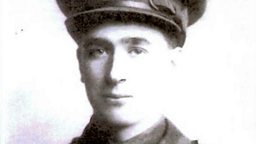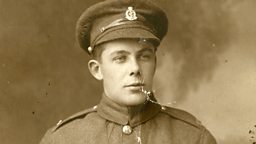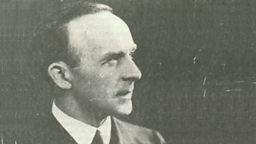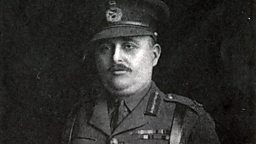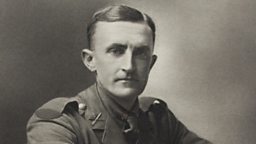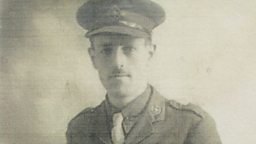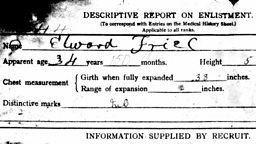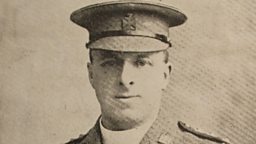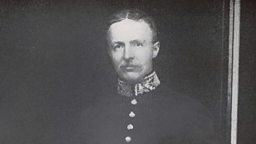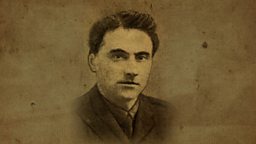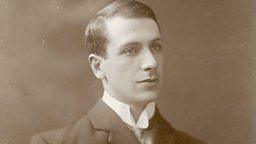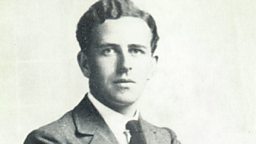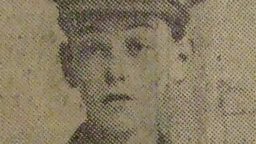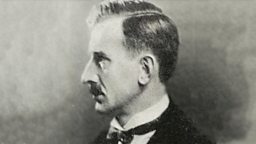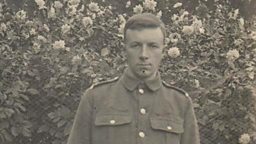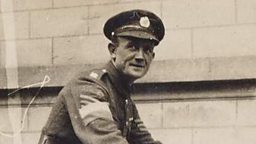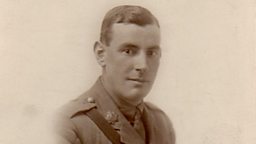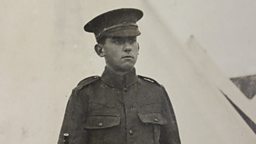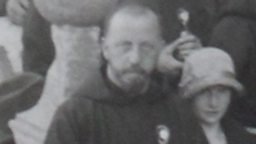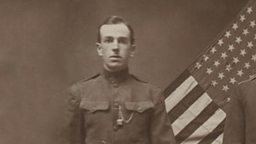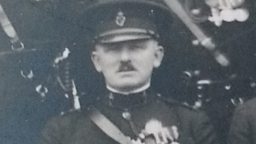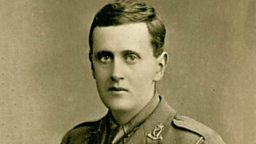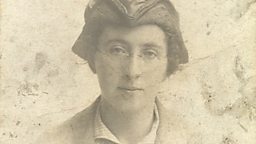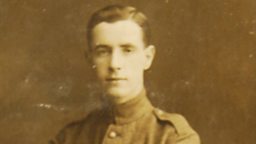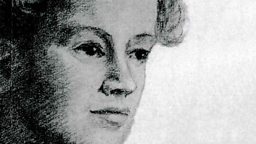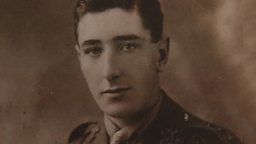John Kennedy Hope
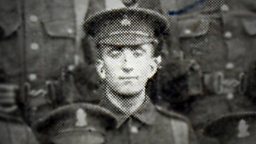
Holding the front line
John Kennedy Hope was born at 17 Shore Street in Holywood, County Down, in December 1893, and went on to live in Belfast's York Road area.
All the shells in Europe seem to be falling round us
Before the war he appears to have worked at the printing company W&G Baird Ltd in Arthur Street, Belfast, before enlisting with the 14th Royal Irish Rifles, 36th (Ulster) Division, in September 1914.
In their roll, he is then listed as a Wesleyan, and a single man, with his father as his next-of-kin.
Memoir
Hope wrote an unpublished memoir of his wartime experiences, saying: "prompted to record my experiences as a common infantry man ... I write this epistle in the winter of 1928 ..." As an aide-memoir, he used a small map which he had had during World War One: "I followed every movement in France by the aid of this map which contained in very small print the names of every village and hamlet and gave all the roads we used."
In it, he explained: "I chronicle only the main incidents ... Ex the trenches is the man who counts; the man who holds the front line. The man is in constant danger of being blown out of the trenches or pinched by the scrap of the neck in a raid, or unceremoniously shot dead."
Training and trench life
Hope's recollections provide very distinctive descriptions of his training, arrival in France, and the company's first ventures in trench warfare and trench life, before he writes a graphic account of 1 July 1916.
Of training, he notes: "We are off to Finner Camp near Bundoran on the Donegal side. It's a god-forsaken place - as bare as a golf ball ... There is-no horse transport yet - everything has to be hawked about ... and not by any means solidly built I feel the strain ..."
Soon, Hope senses a difference: "A great change has come over the camp. Civvy suits give way to khaki. Seems as if there is a war on! Old soldiers and young ones too get their rank. Officers are commissioned. McKee says "he's Jimmy no longer by kings this that and the other thing."
Reality dawns on arrival in France: "We are on board the old I.O.M. paddle steamer Empress which is crawling into Le Havre on the morning of October 6th, 1915. The sight of a large hospital ship with thousands of lights gives as food for thought."
Conditions in the trenches are difficult: "We sample the wire beds. They are very comfortable, but there is too much water dripping from the roof. We cover ourselves with the rubber sheet which we should lie on. There is an uncanny feeling, something is jumping over the wet sheet - rats, and they are as big as cats. They are after our haversack where we have our rations. This is something we have discovered and we keep our bread in our Mess tins so that these boys won't eat the heart out of our quarter loaf."
On reaching the trenches, Hope says they discover they are "in a frightful condition so bad that we get thigh rubber boots before we go in. These boots are so scarce that we have to wait till a Reserve Company comes out of the line and we get their rubbers to wear going in. These waders as they are rightly called are stinking, soaking wet and full of holes in the feet. I am wearing a pair about two sizes too big - there is a gap in the left heel and the toes are stuffed with old sandbags. We are like sewer men in these things."
And early on, Hope describes the men's reaction to a possible gas attack: "As the message moves from post to post it changes till the word reaches us GAS! Our post passes on the word GAS and the line must be in an uproar. We pull on the early pattern cloth bag mask and begin to fire. After what seems an age of suffocation we are relieved when someone appears and tells is there is no gas. Only those in such a predicament can realize what a gas attack means. Two kinds of gas are used chlorine and phosgene which turns the lungs into water in a few seconds."
Baptism of fire
Hope describes how, in the line, his company experiences what he considers to be its baptism of fire:
"A Hun bombardment opens right in the Communication trench up which we are passing. All the shells in Europe seem to be falling round us. Hell is let loose somewhere. We are in the middle of our baptism of fire... Thousands of rounds of ammunition are fired into the dead of night but the Hun doesn't venture into our line. We have had a terrible hour ..."
The Somme
Build-up to the battle
Of the run up to the first day of the Battle of the Somme, Hope recalls intense preparations: "We unload wagons at Lancashire dump in the wood, so near the line that everything is muffled, so near that even the neighing of a mule will bring the 'circus' on our track. The dump is a living mass of humanity at night all working overtime in the great preparations for what we now call the 'big do'. We fill sandbags by the thousand in the wood during the day and at night carry them forward to the great causeway which is being built to take us over to Thiepval."
Hope concludes: "We are worked to death."
A few days before the attack, the company is moved into position. In the immediate hours before it, Hope recalls that "Everybody seems to known exactly what has to be done. The feeling one has about it all is anything but pleasant ..."
"I have no fear of death. No fear at the moment. I do not yet know what, is it like to face death - not yet - it is only a matter of hours and then!"
"The curtain lifts on the greatest bombardment of the war up till now ..."
1 July 1916
Hope says: "The attack opens at 7-30 a.m. 1 Jul 1916. We move forward through the counter barrage which is now at its worst. We carry consolidating material. I am saddled with a shovel down by back and an enormous coil of wire over my shoulders. Alex - the tallest man in the regiment - is my consoling companion over the front line. A big 5/9 high explosive greets us as we emerge over the top. Alex and I walk right into it."
Surviving this, Hope writes: "I wheel round the Hun trenches and link up with an assortment of Inniskillings and Rifles. We appear to be in a very advanced position and are warned to get ready to meet a counter attack."
But this does not happen. Instead, Hope says, they realise the Germans are "not coming over the open. He is going to try picking us off, one by one, at a distance. A 9th Inniskilling lying at the top has got a bullet through steel hat. He rolls over into the trenches at my feet. He is an awful sight. His brain is oozing out of the side of his head, and he is calling for his pal. An occasional, cry of 'Billy Gray, Billy Gray, will you not come to me?' In a short time all is quiet, he is dead. He's the servant to an officer who is lying in the trench with a fractured thigh, and won't let anyone touch him, and is bleeding badly. They die together."
Hope waits until "Dusk sets in. Most of the party I am operating with are casualties." He sets off "to see if I can find a bigger squad", but discovers "I have walked right into where the counter attack is coming. The Hun heavies have registered on our trench and we get an awful drenching of 5:9 shrapnel ... High velocity shells plug the earth all round ..."
He describes how "the shelling becomes unbearable and I shift along the line about 50 yards. It is a good move." He misses their trench being attacked by the Germans, he says, who jump into it; he recalls that he was among a few who escaped.
Hope describes a precarious journey back to the lines, during which "I move cautiously", until finally: "We guess our position and run down the hill as fast as our legs will take us, over the Hun front line; over the famous sunken road and jump into our front line at the top of Elgin Av."
He is back, but "The big day is a complete wash-out, a company wash out or a Divisional wash-out if you like. Our batt musters only a few in the morning when we assemble in the lower reaches of Thiepval."
And Hope recollects their realisation of losses as names are called, and find men "are missing from the Roll Call. The company is but a shadow, where are the officers ... Gone!"
Subsequent Army experience
Hope's memoir continues with his experiences across the war. He became a Lance Corporal, and was awarded the Military Medal, recalling of this: "The boys who were misbehaving themselves in the Cambrai battle are lined up in the middle. Our misdeeds are read out and we each receive personal congratulations from the Brigadier. Although unfortunately killed the officer of the Inniskillings whom we as a platoon supported in the Cambrai Street, is awarded the VC. Capt Morrow of our company, gets the MC, and I get the equivalent!"
A press report regarding his decoration stated Kennedy Hope had been "awarded the Military Medal for bravery and devotion to duty. Under a hail of machine-gun bullets he charged the enemy's trenches and captured seven Huns single-handed."
Hope was, however, injured in 1918: "The bullets splash into us and takes a heavy toll. I drop my gun for the last time, a bullet has caught me at last." Chloroformed for treatment, he says "I wish I had never wakened. I am lying on my back with my arm in a wire splint tied to the ceiling of the Hut. I have a seven inch rip in the region of my elbow. Two inches of bone above the elbow are gone and there is a hole in my arm 1 & 1/2 inches wide."
He recalls, "On Armistice morning I am evacuated to England on a stretcher", and in hospital is "told I will never use my arm again". But with treatment, he notices improvement: "I see the wonderful change brought about", and says: "I am very much alive."
Eventually, he is released: "I arrive home on 23rd February 1919."
After the war
Hope was discharged in February 1919, and was awarded a Silver War Badge.
After the war, he lived in Greenisland (a small village on the coast of Belfast Lough) and worked as a printer's clerk.
John Kennedy Hope died on 16 January 1951.
These pages are based on personal testimonies and contemporaneous accounts. They reflect how people saw things at that time and are not meant to be a definitive history of the period.
Voices 16 objects
Voices 16 galleries
Credits
Thanks to the for the image of John Kennedy Hope, and permission to cite from his unpublished memoir, 1914-1918 Reminiscences, 14th Battalion, Royal Irish Rifles.
